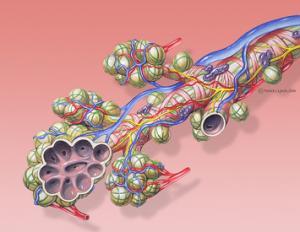
Image adapted from Patrick J. Lynch (wikimedia) under a Creative Commons license: BY.
The major objective of this sequence is for the students to gain an understanding of the structure and function of the cardiovascular and respiratory systems through lectures, laboratory exercises, patient presentation and small group conferences.
Sequence Director: Louis D'Alecy, Ph.D.
dScribe: Matthew Wixson
Syllabus
Objectives
For each of the subtopics of the sequence a list of comprehensive behavioral goals and cognitive objectives will explicitly define what a student should know and be able to do by the end of the sequence. These objectives provide a focus for "active" studying. It is important to note that mastery of the "basic facts" concerning structure and function, as defined in these lists of cognitive objectives, is an essential, but only the first step, in life long learning. You must also be able to use these facts in a logical manner to solve problems. Physiologic and pathophysiologic problem solving is the basis of medical practice. Accordingly, examinations will attempt to test not only for mastery of the cognitive objectives but, to the extent we are able, to test for your ability to manipulate this material, i.e., for your ability to solve problems.
Small Group Discussions
These sessions will provide you with an opportunity to discuss, analyze, and interpret signs and symptoms as they relate to the underlying physiological principles you have learned. The purpose of these sessions is not to teach you how to diagnosis specific diseases but to provide practice in applying physiological principles to interpreting various pathophysiological states. The problem to be discussed, and the questions you will be expected to consider during the discussion, will be provided prior to the discussion. Attendance at small group discussions is required and specific student room assignments are made by the Office of Medical Education. Failure to attend for any reason will require you to submit written answers to the small group discussion questions to the Sequence Coordinator within 72 hours of the small group session
Required Textbooks
- Cardiovascular Physiology - David E. Mohrman and Lois Jane Heller, McGraw-Hill, 6th Ed., 2006. ~$35
- There will be copies of this textbook on reserve at Taubman Medical Library. Older editions are similar but some figure numbers and chapter content have changed.
- Pulmonary Physiology - Michael G. Levitzky, McGraw-Hill, 7h Ed., 2007
- There will be copies of this textbook on reserve at Taubman Medical Library.
Supplementary Textbook:
- Respiratory Physiology: The Essentials - John B. West, Williams and Wilkins, 7th Ed., 2004.
- There will be copies of this textbook on reserve at Taubman Medical Library.
Additional Reading
Additional Books on Reserve at the Medical Library:
- General Introductory Text: Vander, Sherman, and Luciano. Human Physiology, The Mechanisms of Body Function, McGraw-Hill Inc, (10th edition), 2005
- There will be copies of this textbook on reserve at Taubman Medical Library.
Comprehensive medical physiology texts:
- Berne and Levy. Physiology, Mosby Year Book, (5th ed.), 2005.
- Guyton & Hall. Textbook of Medical Physiology, W. B. Saunders Company, (11th edition), 2006.
- Ganong. Review of Medical Physiology, Lange, (22nd edition), 2005
Sequence Performance, Quiz, Exams and Sequence Grade
Performance will be assessed by participation in the Small Group Exercises as well as by the quizzes and a comprehensive final exam. No “new” content from the Small Group Exercise will be added to the final. The final exam will include both written and practical components. The sequence content will be represented on the quiz and final approximately based on the time allocated in class. Questions on the quizzes, practical, and final all will be worth 1 point. In order to pass the course students must achieve a total score of at least 75% on these exercises and fulfill the responsibilities to the Small Group Exercise and Longitudinal Case.
Required Experiences
In the Cardiovascular/Respiratory sequence there are several required experiences. In the RARE circumstance where a student cannot attend, the student must contact their class counselor in advance (or as soon as possible in an emergency) to request a deferral. (Please do NOT contact sequence directors with requests for or explanations of deferrals.) Absences will be approved or denied by class counselors based on the same guidelines used for Quiz and Exam deferrals. Should you obtain a deferral from your class counselor, make up instructions for the required experiences (found below) should be followed.
Failure to attend either small group session for any reason will require you to submit written answers to the small group discussion questions to the Sequence Coordinator within 72 hours of the small group session
Remediation for missing the MDC or Dr. Bartlett's talk will be to watch the video and write a 2 page essay detailing your reactions, including knowledge, insights, and inspirations gained from the presentation. This is due to the sequence coordinator withing 72 hours of the session.
Cardiovascular/Respiratory Sequence Faculty
- Louis D’Alecy, Ph.D., Sequence Coordinator - Professor of Physiology, Dept. of Molecular & Integrative Physiology
- Gerald Abrams, M.D. - Professor, Department of Pathology
- A. Kent Christensen, Ph.D. - Professor Emeritus of Cell and Developmental Biology, Dept of Cell and Developmental Biology
- Robert Bartlett, M.D. - Professor, Department of Surgery
- Thomas Gest, Ph.D. - Associate Professor of Anatomical Sciences, Office of Medical Education
- Peter Jacobson, J.D., M.P.H. - Professor of Public Health, Department of Health Management and Policy, School of Public Health
- Sun-Kee Kim, Ph.D. - Professor of Cell and Developmental Biology, Department of Cell and Developmental Biology
- Mohan Kulkarni, M.D. - Thoracic Surgery, Foote Hospital, Jackson, MI
- Richard Neubig, M.D., Ph.D. - Professor of Pharmacology, Departments of Pharmacology and Internal Medicine
- Perry Pernicano, M.D. - Clinical Assistant Professor, Department or Radiology
- Steve Ramsburgh, M.D. - Assistant Professor, Department of Pathology
- Marshal Shlafer, Ph.D. - Professor of Pharmacology, Department of Pharmacology
- Thomas Sisson, M.D. - Assistant Professor, Department of Internal Medicine
- John Traynor, Ph.D. - Associate Professor of Pharmacology, Department of Pharmacology
- J. Matthew Velkey, M.S. - Lecturer, Department of Cell & Developmental Biology
- Michael Welsh, Ph.D. - Professor of Cell and Developmental Biology, Dept of Cell and Developmental Biology
Learning Objectives
For each of the subtopics of the sequence a list of comprehensive behavioral goals and cognitive objectives will explicitly define what a student should know and be able to do by the end of the sequence. These objectives provide a focus for "active" studying. It is important to note that mastery of the "basic facts" concerning structure and function, as defined in these lists of cognitive objectives, is an essential, but only the first step, in life long learning. You must also be able to use these facts in a logical manner to solve problems. Physiologic and pathophysiologic problem solving is the basis of medical practice. Accordingly, examinations will attempt to test not only for mastery of the cognitive objectives but, to the extent we are able, to test for your ability to manipulate this material, i.e., for your ability to solve problems.
The core information necessary to master these objectives will be presented primarily in lecture. Sometimes the lecturer will indicate that specific outside readings are essential for mastery of an objective. Therefore, some material will either not be given at all in lecture or will not be adequately covered in the lecture. Regardless of the level of lecture coverage you are responsible for, and can be examined on, the material designated in the listed course objectives.
Reading List
Required Textbooks
- Cardiovascular Physiology - David E. Mohrman and Lois Jane Heller, McGraw-Hill, 6th Ed., 2006. ~$35
- There will be copies of this textbook on reserve at Taubman Medical Library. Older editions are similar but some figure numbers and chapter content have changed.
- Pulmonary Physiology - Michael G. Levitzky, McGraw-Hill, 7h Ed., 2007
- There will be copies of this textbook on reserve at Taubman Medical Library.
Supplementary Textbook:
- Respiratory Physiology: The Essentials - John B. West, Williams and Wilkins, 7th Ed., 2004.
- There will be copies of this textbook on reserve at Taubman Medical Library.
Additional Reading
Additional Books on Reserve at the Medical Library:
- General Introductory Text: Vander, Sherman, and Luciano. Human Physiology, The Mechanisms of Body Function, McGraw-Hill Inc, (10th edition), 2005
- There will be copies of this textbook on reserve at Taubman Medical Library.
Comprehensive medical physiology texts:
- Berne and Levy. Physiology, Mosby Year Book, (5th ed.), 2005.
- Guyton & Hall. Textbook of Medical Physiology, W. B. Saunders Company, (11th edition), 2006.
- Ganong. Review of Medical Physiology, Lange, (22nd edition), 2005

Image adapted from Patrick J. Lynch (wikimedia) under a Creative Commons license: BY.
| Document Title | Creator | Downloads | License |
|---|---|---|---|
|
Syllabus |
Louis D'Alecy
|
| Document Title | Creator | Downloads | License |
|---|---|---|---|
|
10.27.08: Introduction Homeostasis/Cardiovascular System |
Louis D'Alecy
|
||
|
10.28.08: Cardiac Muscle |
Louis D'Alecy
|
||
|
10.29.08(a): Cardiac Hydraulics |
Louis D'Alecy
|
||
|
10.29.089(b): Blood and Bone Marrow |
Matthew Velkey
|
||
|
10.31.08(a): History of the Electrocardiogram |
Joel Howell
|
||
|
10.31.08(b): Lecture Handout - History of the Electrocardiogram |
Joel Howell
|
||
|
10.31.08: Physiological Basis of ECG |
Louis D'Alecy
|
||
|
11.03.08(a): Hemodynamics |
Louis D'Alecy
|
||
|
11.03.08(b): Regulation of Arterial Blood Pressure |
Louis D'Alecy
|
||
|
11.03.08(c): Histology of the Cardiovascular System |
Kent Christensen
|
||
|
11.05.08(a): Coronary Blood Flow |
Louis D'Alecy
|
||
|
11.05.08(b): Other Reflexes and Reflex Actions |
Louis D'Alecy
|
||
|
11.07.08: Venous Tone and Venous Return |
Louis D'Alecy
|
||
|
11.10.08(a): Cerebral Blood Flow |
Louis D'Alecy
|
||
|
11.10.08(b): Microcirculation |
Louis D'Alecy
|
||
|
11.10.08(c): Circulatory Derangements I |
Gerald Abrams
|
||
|
11.10.08(d): Histology of the Respiratory Tract |
Michael Hortsch
|
||
|
11.11.08: Body Temperature Regulation |
Louis D'Alecy
|
||
|
11.12.08(a): Systemic Stress Response |
Louis D'Alecy
|
||
|
11.12.08(b): Respiratory Mechanics I |
Louis D'Alecy
|
||
|
11.13.08: Circulatory Derangements II |
Gerald Abrams
|
||
|
11.14.08: Respiratory Mechanics II |
Louis D'Alecy
|
||
|
11.17.08(a): Alveolar Ventilation |
Louis D'Alecy
|
||
|
11.17.08(b): Alveolar Ventilation II |
Louis D'Alecy
|
||
|
11.17.08(c): Pulmonary Blood Flow |
Thomas Sisson
|
||
|
11.18.08(a): O2 and CO2 Transport |
Louis D'Alecy
|
||
|
11.18.08(b): Respiratory Control, Ventilation, and Regulation of PaCO2 |
Louis D'Alecy
|
||
|
11.18.08(c): Diffusion of Gases |
Thomas Sisson
|
||
|
11.18.08(d): Heart Failure |
Gerald Abrams
|
||
|
11.19.08: Ventilation/Perfusion Matching |
Thomas Sisson
|
||
|
11.21.08(a): Integrated Cardiac Output and Respiratory Function |
Louis D'Alecy
|
||
|
11.21.08(b): The Role of Litigation in forming Public Health Policy: Tobacco |
Peter Jacobson
|
| Document Title | Creator | Downloads | License |
|---|---|---|---|
|
2006 Daily Schedule: M1 Cardiovascular / Respiratory |
Dept. Staff
|
||
|
2007 Daily Schedule: M1 Cardiovascular / Respiratory |
Dept. Staff
|
||
|
2008 Daily Schedule: M1 Cardiovascular / Respiratory |
Dept. Staff
|
||
|
2009 Daily Schedule: M1 Cardiovascular / Respiratory |
Dept. Staff
|



